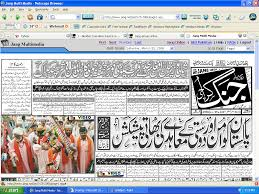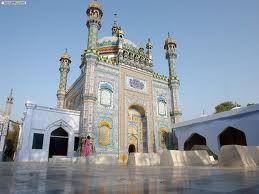Shah Abdul Latif Bhittai (also referred to by the honorifics:
Lakhino Latif,
Latif Ghot,
Bhittai, and
Bhitt Jo Shah) (1689 – 1752) (
Sindhi:
شاهه عبداللطيف ڀٽائي ,
Urdu:
,شاہ عبداللطیف بھٹائی) is famous
Afghan-origin
Sindhi Sufi scholar,
mystic, saint,
poet, and
musician. He is widely considered to be one of the greatest poets of the
Sindhi language. His collected poems were assembled in the compilation
Shah Jo Risalo, which exists in numerous versions and has been translated to
English,
Urdu, and other languages. His work has been compared frequently to great
Persian poet
Rūmī.
Seyyed Hossein Nasr, Professor of
Islamic studies at
George Washington University, described Shah Latif as a “direct emanation
Rūmī‘s spirituality in South Asia
Bhittai’s ancestry
According to most scholars, Shah Abdul Latif Bhittai’s lineage goes back to the
Khwarizim Shahs, others claim he was a descendant of
Mohammad and grandson of Mohammad. He however used the term “Shah” as a surname.
His ancestors had come from
Herat in
Afghanistan to
Sindh, after it was sacked by
Timur and his
Mongol forces.
Shah Abdul Karim Bulri (1600s), whose mausoleum stands at Bulri, about 40 miles from
Hyderabad, a mystic Sufi poet of considerable repute, was his great, great grandfather. His verses in
Sindhi are existent and his anniversary is still held at Bulri, in the form of an Urs.
His father Syed Habib Shah, lived in Hala Haveli, a small village, at a distance of about forty miles from Matiari and not far from the village of Bhitshah. Later he left this place and moved to
Kotri, where Shah Abdul Latif Bhittai spent some part of his adolescent life.
Aurangzeb. he was a great poet
The early life
Shah Abdul Latif was born to Shah Habib in the village Hala Haveli a few miles to the east of the present town of Bhit Shah (named after him), on Safar 14, 1102 A.H. i.e. November 18, 1690 CE.
Young Latif was raised during the golden age of sindhi culture. His first teacher was Akhund Noor Muhammad Bhatti, But, mostly,he was self-educated. Although he received little formal education, the Risalo gives us an ample proof of the fact that he was well-versed in
Arabic and
Persian. The
Qur’an, the
Hadiths, the Masnawi of
Maulana Jalaluddin Rumi,
Shah Inayatullah, along with the collection of Shah Karim’s poems, were his constant companions, copious references of which have been made in
Shah Jo Risalo. He is also known for his famed
Calligraphic, and hand written skills he made several copies of the
Qur’an.
His correspondence in Persian with contemporary scholar
Makhdoom Moinuddin Thattvi, as contained in the Risala-i-Owaisi, bears witness to his scholastic competence.
| “ |
“Beloved’s separation kills me friends, At His door, many like me, their knees bend. From far and near is heard His beauty’s praise, My Beloved’s beauty is perfection itself.” …..Bhittai [Sur Yaman Kalyan] |
” |
In his poems he writes about
Sindh and its neighboring regions, he mentions the distant cities such as
Istanbul and
Samarqand, he also writes about Sindhi sailors (
Samundi) their navigation techniques, voyages as far as to the
Malabar coast,
Sri Lanka and the island of
Java.
Most of the information on the life of Bhittai has been collected from oral traditions. A renowned Pakistani scholar, educationist, and a foremost writer of plays, dramas and stories,
Mirza Kalich Beg has rendered a yeoman service to Sindhi literature by collecting details about the early life of Shah Bhittai, from the dialogues that he has constantly held with some of the old folks, still living at that time, who knew these facts from their fathers and grandfathers for they had seen Shah Latif in person and had even spoken to him.
| “ |
“The next day I sat down, and listened to the Story of the ‘Vairagis.’ Their salmon-coloured clothes were covered with dust. The lonely ones never talk to anyone about their being. They move about unmarked amongst the common folk.” ……..Shah Latif Bhittai |






